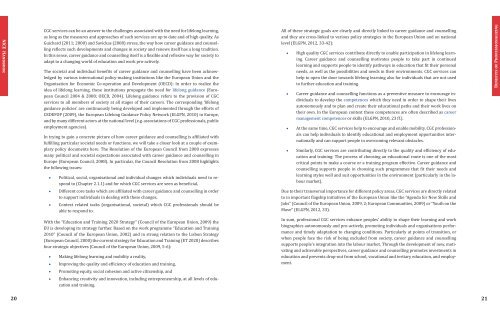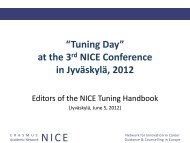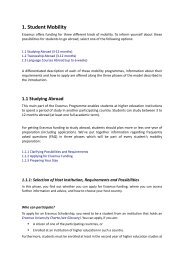NICE HANDBOOK â Academic training of Career ... - Nice-network.eu
NICE HANDBOOK â Academic training of Career ... - Nice-network.eu
NICE HANDBOOK â Academic training of Career ... - Nice-network.eu
You also want an ePaper? Increase the reach of your titles
YUMPU automatically turns print PDFs into web optimized ePapers that Google loves.
<strong>NICE</strong> HandbookCGC services can be an answer to the challenges associated with the need for lifelong learning,as long as the measures and approaches <strong>of</strong> such services are up to date and <strong>of</strong> high quality. AsGuichard (2011; 2000) and Savickas (2008) stress, the way how career guidance and counsellingreflects such developments and changes in society and renews itself has a long tradition.In this sense, career guidance and counselling itself is a flexible and reflexive way for society toadapt to a changing world <strong>of</strong> education and work pro-actively.The societal and individual benefits <strong>of</strong> career guidance and counselling have been acknowledgedby various international policy-making institutions like the European Union and theOrganisation for Economic Co-operation and Development (OECD): In order to realize theidea <strong>of</strong> lifelong learning, these institutions propagate the need for lifelong guidance (EuropeanCouncil 2004 & 2008; OECD, 2004). Lifelong guidance refers to the provision <strong>of</strong> CGCservices to all members <strong>of</strong> society at all stages <strong>of</strong> their careers. The corresponding ‘lifelongguidance policies’ are continuously being developed and implemented through the efforts <strong>of</strong>CEDEFOP (2009), the European Lifelong Guidance Policy Network (ELGPN, 2010) in Europe,and by many different actors at the national level (e.g. associations <strong>of</strong> CGC pr<strong>of</strong>essionals, publicemployment agencies).In trying to gain a concrete picture <strong>of</strong> how career guidance and counselling is affiliated withfulfilling particular societal needs or functions, we will take a closer look at a couple <strong>of</strong> exemplarypolicy documents here. The Resolution <strong>of</strong> the European Council from 2008 expressesmany political and societal expectations associated with career guidance and counselling inEurope (European Council, 2008). In particular, the Council Resolution from 2008 highlightsthe following issues:◆◆Political, social, organisational and individual changes which individuals need to respondto (Chapter 2.1.1) and for which CGC services are seen as beneficial,Different core tasks which are affiliated with career guidance and counselling in orderto support individuals in dealing with these changes,Context related tasks (organisational, societal) which CGC pr<strong>of</strong>essionals should beable to respond to.All <strong>of</strong> these strategic goals are clearly and directly linked to career guidance and counsellingand they are cross-linked to various policy strategies in the European Union and on nationallevel (ELGPN, 2012, 33-42):◆◆◆◆◆◆◆◆High quality CGC services contribute directly to enable participation in lifelong learning.<strong>Career</strong> guidance and counselling motivates people to take part in continuedlearning and supports people to identify pathways in education that fit their personalneeds, as well as the possibilities and needs in their environments. CGC services canhelp to open the door towards lifelong learning also for individuals that are not usedto further education and <strong>training</strong>.<strong>Career</strong> guidance and counselling functions as a preventive measure to encourage individualsto develop the competences which they need in order to shape their livesautonomously and to plan and create their educational paths and their work lives ontheir own. In the European context these competences are <strong>of</strong>ten described as careermanagement competences or skills (ELGPN, 2010, 23 ff.).At the same time, CGC services help to encourage and enable mobility. CGC pr<strong>of</strong>essionalscan help individuals to identify educational and employment opportunities internationallyand can support people in overcoming relevant obstacles.Similarly, CGC services are contributing directly to the quality and efficiency <strong>of</strong> educationand <strong>training</strong>: The process <strong>of</strong> choosing an educational route is one <strong>of</strong> the mostcritical points to make a course or a <strong>training</strong> program effective. <strong>Career</strong> guidance andcounselling supports people in choosing such programmes that fit their needs andlearning styles well and suit opportunities in the environment (particularly in the labourmarket).Benefits <strong>of</strong> Pr<strong>of</strong>essionalizing◆◆◆◆Due to their transversal importance for different policy areas, CGC services are directly relatedto in important flagship initiatives <strong>of</strong> the European Union like the “Agenda for New Skills andJobs” (Council <strong>of</strong> the European Union, 2009, 2; European Communities, 2009) or “Youth on theMove” (ELGPN, 2012, 33).With the “Education and Training 2020 Strategy” (Council <strong>of</strong> the European Union, 2009) theEU is developing its strategy further. Based on the work programme “Education and Training2010” (Council <strong>of</strong> the European Union, 2002) and in strong relation to the Lisbon Strategy(European Council, 2000) the current strategy for Education and Training (ET 2020) describesfour strategic objectives (Council <strong>of</strong> the European Union, 2009, 5-6):◆◆◆◆◆◆◆◆Making lifelong learning and mobility a reality,Improving the quality and efficiency <strong>of</strong> education and <strong>training</strong>,Promoting equity, social cohesion and active citizenship, andEnhancing creativity and innovation, including entrepren<strong>eu</strong>rship, at all levels <strong>of</strong> educationand <strong>training</strong>.In sum, pr<strong>of</strong>essional CGC services enhance peoples’ ability to shape their learning and workbiographies autonomously and pro-actively, promoting individuals and organisations performanceand timely adaptation to changing conditions. Particularly at points <strong>of</strong> transition, orwhen people face the risk <strong>of</strong> being excluded from society, career guidance and counsellingsupports people’s integration into the labour market. Through the development <strong>of</strong> new, motivatingand achievable perspectives, career guidance and counselling promotes investments ineducation and prevents drop-out from school, vocational and tertiary education, and employment.20 21






